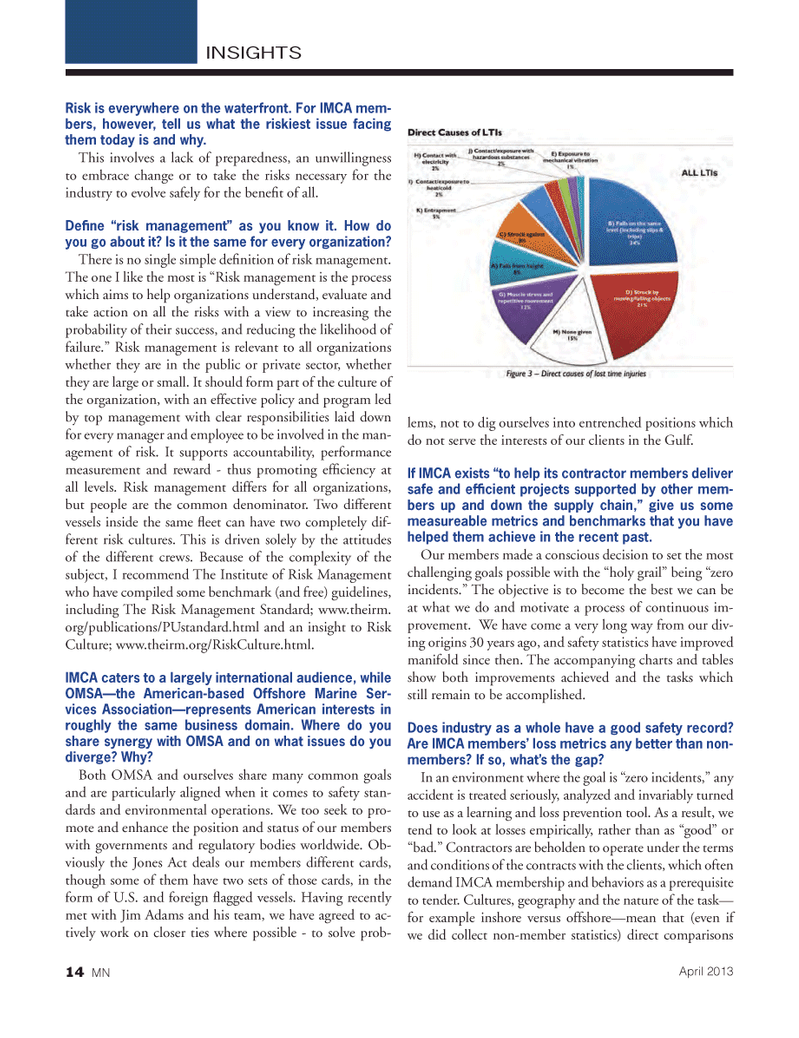
Page 14: of Marine News Magazine (April 2013)
Offshore Service Operators
Read this page in Pdf, Flash or Html5 edition of April 2013 Marine News Magazine
Risk is everywhere on the waterfront. For IMCA mem- bers, however, tell us what the riskiest issue facing them today is and why. This involves a lack of preparedness, an unwillingness to embrace change or to take the risks necessary for the industry to evolve safely for the beneÞ t of all. DeÞ ne Òrisk managementÓ as you know it. How do you go about it? Is it the same for every organization? There is no single simple deÞ nition of risk management. The one I like the most is ÒRisk management is the process which aims to help organizations understand, evaluate and take action on all the risks with a view to increasing the probability of their success, and reducing the likelihood of failure.Ó Risk management is relevant to all organizations whether they are in the public or private sector, whether they are large or small. It should form part of the culture of the organization, with an effective policy and program led by top management with clear responsibilities laid down for every manager and employee to be involved in the man- agement of risk. It supports accountability, performance measurement and reward - thus promoting efÞ ciency at all levels. Risk management differs for all organizations, but people are the common denominator. Two different vessels inside the same ß eet can have two completely dif- ferent risk cultures. This is driven solely by the attitudes of the different crews. Because of the complexity of the subject, I recommend The Institute of Risk Management who have compiled some benchmark (and free) guidelines, including The Risk Management Standard; www.theirm. org/publications/PUstandard.html and an insight to Risk Culture; www.theirm.org/RiskCulture.html. IMCA caters to a largely international audience, while OMSAÑthe American-based Offshore Marine Ser- vices AssociationÑrepresents American interests in roughly the same business domain. Where do you share synergy with OMSA and on what issues do you diverge? Why? Both OMSA and ourselves share many common goals and are particularly aligned when it comes to safety stan- dards and environmental operations. We too seek to pro- mote and enhance the position and status of our members with governments and regulatory bodies worldwide. Ob- viously the Jones Act deals our members different cards, though some of them have two sets of those cards, in the form of U.S. and foreign ß agged vessels. Having recently met with Jim Adams and his team, we have agreed to ac- tively work on closer ties where possible - to solve prob- lems, not to dig ourselves into entrenched positions which do not serve the interests of our clients in the Gulf. If IMCA exists Òto help its contractor members deliver safe and efÞ cient projects supported by other mem- bers up and down the supply chain,Ó give us some measureable metrics and benchmarks that you have helped them achieve in the recent past. Our members made a conscious decision to set the most challenging goals possible with the Òholy grailÓ being Òzero incidents.Ó The objective is to become the best we can be at what we do and motivate a process of continuous im- provement. We have come a very long way from our div- ing origins 30 years ago, and safety statistics have improved manifold since then. The accompanying charts and tables show both improvements achieved and the tasks which still remain to be accomplished. Does industry as a whole have a good safety record? Are IMCA membersÕ loss metrics any better than non- members? If so, whatÕs the gap? In an environment where the goal is Òzero incidents,Ó any accident is treated seriously, analyzed and invariably turned to use as a learning and loss prevention tool. As a result, we tend to look at losses empirically, rather than as ÒgoodÓ or Òbad.Ó Contractors are beholden to operate under the terms and conditions of the contracts with the clients, which often demand IMCA membership and behaviors as a prerequisite to tender. Cultures, geography and the nature of the taskÑ for example inshore versus offshoreÑmean that (even if we did collect non-member statistics) direct comparisons INSIGHTS14 MNApril 2013MN April2013 Layout 1-17.indd 14MN April2013 Layout 1-17.indd 144/1/2013 10:57:59 AM4/1/2013 10:57:59 AM

 13
13

 15
15
